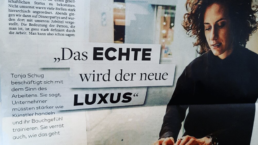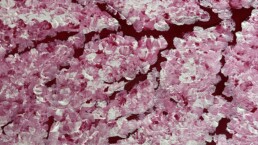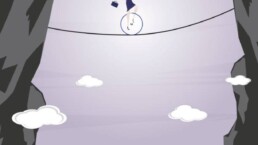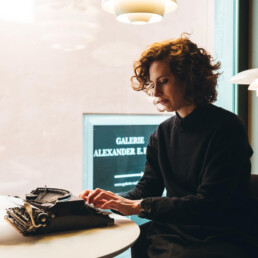
In this episode of my Letter of Inspiration, I talk about the current cocktail of tiredness and fear that is accompanying us, about the role played by the right impulses in getting us moving again, and how refreshingly flexible thinking can be. Enjoy!
If you’re standing still, you aren’t moving.
The summer has shown itself once again in all its glory. Besides abundant joy, it also brought complaints: just as summer vacations are drawing to a close, the hustle and bustle here in Zurich is beginning to pick up speed and intensity again. Meanwhile, the warm weather has a paralyzing effect and makes us lethargic. Thinking becomes more difficult and the call of Lake Zurich for a cooling dip becomes louder. On one hand, we are tired because of the heat, and on the other hand, we are afraid of the insecurity of a second wave—a combination that probably would have been called "dangerous" in a history book. If the forecasts are right, we in the business world are heading for something that would be optimistically described as a major change, and in ordinary speech as a crisis. So how do we change history and float out of the vortex of paralyzing fatigue and fear of the future?
"In a ship in stormy seas, he who stands still and does not move falls over."
Ludwig Börne, German writer
What has announced itself the last decades, is in no small measure the consequence of unlimited availability, which has led to excessive consumption, much like a child left in a candy store unattended. In the post-war period this was legitimate: people enjoyed access to that which harsh circumstances had denied them. Enjoyment and wastefulness both contribute to economic growth. But do we still appreciate this luxury today, and are we indeed entitled to it?
Read my published article on the topic: "Luxury as a Discontinued Model"
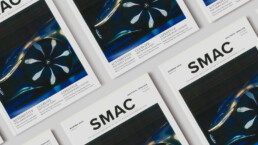
We have grown up surrounded by luxury goods, and it has become infinitely accessible through digitalization and groundbreaking inventions like smartphones. When something is constantly available, it is only human to eventually take it for granted. However, months in isolation make me wonder whether it is still appropriate to take the time to indulge in luxury. Not because it is no longer attractive, but rather because it does not help. Nothing can develop when we remain static. To trigger a reaction, movement is needed—as you already know from Physics 101. And that is also what we need now: movement.
What is the accelerator of our time?
A still incalculable risk hovers over our near future. Coupled with fatigue and fear, this results in a cocktail that would make even James Bond falter. After the Second World War, the ZERO art movement broke through the canvas as an artistic expression of a new beginning, a physical act that released new energy for creation. However, movement does not always have to be physical. Emotions are often described as "I am moved by something". Is it possible to break through the apparent dreariness of exhaustion and anxiety by acting on one's emotions, and what can that look like?
Discovering your own passion
Passion is more than just a job description, it can be found in living according to your values and moral convictions. In addition, what you enjoy doing is not perceived as "work". The popular German philosopher, Markus Gabriel, writes in his current book about "moral progress in dark times" about his insights on a new form of cooperation, one which Gabriel claims is already noticeable in some areas of society, and that he believes will continue to grow. What can this look like?
A few years ago, the term "gig economy" was coined. Young talents who were clearly aware of their skills would immerse themselves in start-ups or companies for short-term contracts to contribute their knowledge over a period of 6 to 12 months. What is now emerging is a wave of freelancers who, like the gig workers, are very clear about what they have to offer. When I hear Markus Gabriel talking about new cooperations, I have a bigger picture in mind of something that will dissolve existing hierarchical company structures and lead to something new on a project-based, talent-oriented and independent basis. Breaking down the big picture into small parts makes it possible to move with more agility and, above all, to correct shortcomings at their source more quickly and with more control over their effects. For managers this means several things: How do I enable my employees to recognize their own strengths? How can I enable personal responsibility? And how can I stand back and let my team create something new? How can I be happy about failures and not judge them? How do I create an environment that allows my employees freedom within the organization?
"It is not the strongest species that survives, nor the most intelligent, but the one that is most likely to adapt to change.”
-Charles Darwin, British naturalist.
If stagnation is not an option, then we must allow for and encourage movement. One way is to seek out new impulses and perspectives that open your eyes to new ways and ideas. These can be found in the stories of the people around you: all it takes is your active listening. I had the privilege to hear such a “behind-the-scenes” story the other day, and have written it down for you: that of a man who trusts in his path and says that he has never felt better since the moment he followed his intuition.
What has inspired me recently?
In order to avoid the notorious second wave, many concert promoters have decided to cancel summer festivals. In Switzerland, health regulations are too restrictive to allow for the usual festival scene. But who says that there has to be a usual one? In this special situation, we need to be flexible in our thinking. It's not a matter of keeping everything the same, but of how you can unfold in a new setting.
One example that is very close to my own heart is the Festival da Jazz in St. Moritz, which this summer reluctantly had to give up its main stage, the legendary Dracula Club. The main aspect of this place is proximity between audience and performers, since it has no stage. So a new main venue had to be found, and together with the unique Grand Hotels onsite and their magnificent ballrooms, new venues were created that met the standards of the health authorities.
It may seem like a lone standout, like the small Gaulish village of Asterix and Obelix. However, it is not about rebelling, but rather about preserving a cultural asset while at the same time allowing for new thinking. This requires courage and openness to leave the familiar behind and yes, probably a few Gauls with a similar mindset. What has just happened in St. Moritz on a small scale can be a model for many entrepreneurs who find themselves in a situation where "the old way doesn’t work anymore". The good news is: it does, just differently.
On my own behalf...
If you enjoyed reading this, make sure to pick up a copy of Die Welt on Monday, August 31! There will be a big interview with me about the future of society and the business world. If you missed to get your copy, you can find the interview online.
Thank you for joining me for this episode of the Letter of Inspiration. Feel free to share this letter with colleagues and friends.
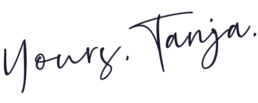
Share
